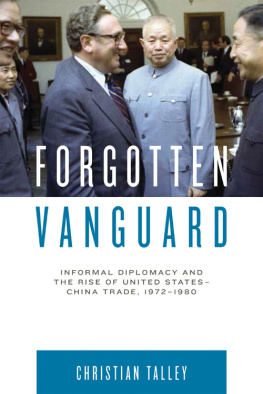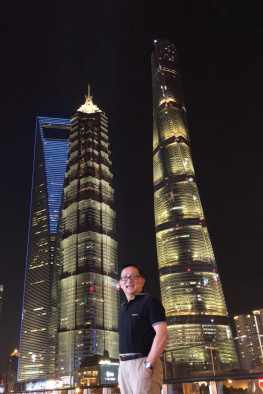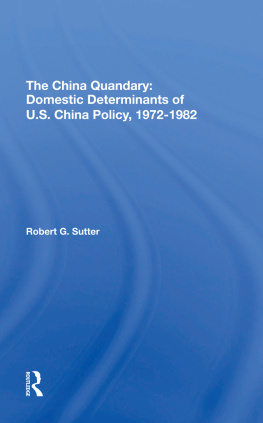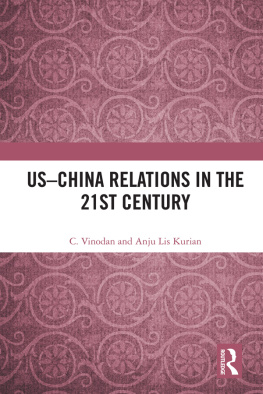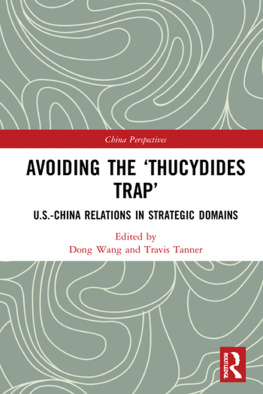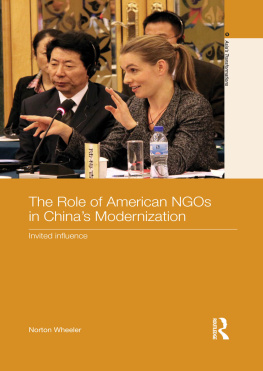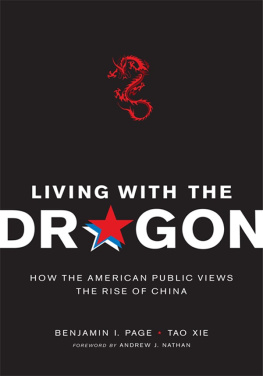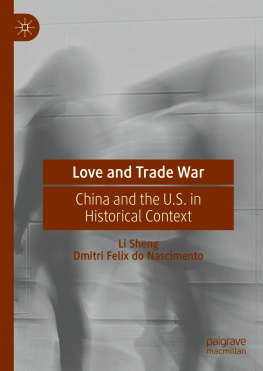FORGOTTEN VANGUARD
FORGOTTEN
VANGUARD
Informal Diplomacy
and the Rise of
United States-China Trade,
19721980
CHRISTIAN TALLEY
University of Notre Dame Press
Notre Dame, Indiana
University of Notre Dame Press
Notre Dame, Indiana 46556
undpress.nd.edu
Copyright 2018 by University of Notre Dame
All Rights Reserved
Published in the United States of America
Library of Congress Cataloging-in-Publication Data
Names: Talley, Christian, 1993- author.
Title: Forgotten vanguard : informal diplomacy and the rise of United States-China trade, 19721980 / Christian Talley.
Description: Notre Dame, Indiana : University of Notre Dame Press, [2018] | Includes bibliographical references and index. |
Identifiers: LCCN 2017055614 (print) | LCCN 2018006566 (ebook) | ISBN 9780268102999 (pdf) | ISBN 9780268103002 (epub) | ISBN 9780268102975 (hardcover : alk. paper) | ISBN 026810297X (hardcover : alk. paper)
Subjects: LCSH: National Council for United States-China Trade. | United StatesForeign economic relationsChina. | ChinaForeign economic relationsUnited States. | United StatesForeign relationsChina.
Classification: LCC HF1456.5.C6 (ebook) | LCC HF1456.5.C6 T35 2018 (print) | DDC 382.0973/051dc23
LC record available at https://lccn.loc.gov/2017055614
This paper meets the requirements of ANSI/NISO Z39.48-1992 (Permanence of Paper)
This e-Book was converted from the original source file by a third-party vendor. Readers who notice any formatting, textual, or readability issues are encouraged to contact the publisher at
For Lucy
Even the objects of simplest sensuous certainty are given to him only through social development, industry, and commercial relations. The cherry tree, like almost all fruit trees, was transplanted into our zone by commerce only a few centuries ago, as we know, and only by this action of a particular society in a particular age has it become sensuous certainty for Feuerbach.
Karl Marx, The German Ideology
CONTENTS
ABBREVIATIONS
AAA American Arbitration Association
AIT American Institute in Taiwan
CCP Chinese Communist Party
CCPIT China Council for the Promotion of International Trade
CIA Central Intelligence Agency
COCOM Coordinating Committee
CSC Committee on Scholarly Communications with China
CSO civil society organization
FDI foreign direct investment
FTAC Foreign Trade Arbitration Commission
FTC foreign trade corporation
GDP gross domestic product
GNP gross national product
IEC Import Export Corporation
ISC Importers Steering Committee
KMT Kuomintang
LDC less developed country
LIEC local import-export commission
MFN most favored nation
MNC multinational corporation
NBER National Bureau of Economic Research
NCUSCR National Committee on United States-China Relations
NCUSCT National Council for United States-China Trade
NGO nongovernmental organization
NIE newly industrializing economy
NSC National Security Council
OPEC Organization of Petroleum Exporting Countries
OPIC Overseas Private Investment Corporation
PRC Peoples Republic of China
PRCLO Peoples Republic of China Liaison Office
PRM Presidential Review Memorandum
ROC Republic of China (Taiwan)
SALT Strategic Arms Limitation Talks
SATC Sino-American trade council
SEZ special economic zone
TEC United States-USSR Trade and Economic Council
TRA Taiwan Relations Act
UFC United Fruit Company
USAID United States Agency for International Development
USCBC US-China Business Council
USSR Union of Soviet Socialist Republics
ACKNOWLEDGMENTS
This project began, as many do, with an accidental discovery. While investigating the Vietnam Wars impact on Chinas geopolitical influence, I noticed a reference to the National Council for United States-China Trade. I had never heard of the group, and its (somewhat ungainly) name caught my eye. Upon this original encounter, I had no pretense of writing a book on the subject. Yet soon, I found myself drawn into a three-year journey to uncover the Councils forgotten history.
Finding the topic was fortunate, but I was more fortunate still in the advice and resources afforded to me throughout my writing. I would like to thank, in no particular order, Thomas Schwartz, Samira Sheikh, and Peter Lorge for their invaluable guidance; my interviewees Eugene Theroux, Dwight Perkins, and Nicholas Ludlow; the dedicated archivists of the Gerald R. Ford Presidential Library; my insightful reviewer Norton Wheeler; the Vanderbilt Department of History, for a generous research grant; its secretary, Heidi Welch; the Vanderbilt University Library; the Bodleian and KB Chen China Centre Libraries; my friend Pete Millwood; and my publishers at Notre Dame.
Christian Talley
Oxford, England
January 2017
Introduction
The Forgotten Importance of the National Council
As I entered, I was greeted by a round of applause and the announcement by the Chairman that I had been elected president of the [National] Council. I expressed appreciation for their vote of confidence in me and pledged my best efforts to live up to their expectations. But, I added, it would be very helpful if you could give me a bit more guidance about the precise role you see for the Council. Oh, said Don Burnham, looking a little puzzled, You know Chris, just to develop our trade and economic relations with the Peoples Republic of China.
Christopher H. Phillips, President of the National Council for United States-China Trade, 19731986
Chinas economic modernization is one of the most important developments in modern history. Though the present remains uncertain, the arc of history suggests a resurgence of Chinas traditional global eminence.
Chinas rise has manifested itself most profoundly in its tremendous economic growth, which has essentially altered the American and global economies. Chinas industrialization poses concerns about pollution, intellectual piracy, and consumer safety. It has simultaneously created an explosion of affordable consumer goods and driven up a massive trade surplus against the United States. In 2013, China produced more than 90% of the worlds personal computers, held $1.3 trillion of American debt, and exported $440 billion worth of goods to America.
China is, self-evidently, important. Unsurprisingly, literature on United States-China relations and United States-China trade has proliferated in the past three decades. The Library of Congress lists almost one thousand relevant books and periodicals in its collections. Given this attention, one would expect vigorous investigation of relevant historiographical issues: the periodization of trades growth, the contingent nature of Sino-US globalization, and the importance of Taiwan in American trade relations with China. While a broad consensus on these central questions has emerged, scholarship on United States-China trade remains understudied in important ways.
I challenge pervasive historical assumptions about the growth of Sino-US trade by examining the National Council for United States-China Trade (NCUSCT). The National Council was a private, nongovernmental organization (NGO) established in 1973 by the US government and composed of diverse and powerful American businesses. Its first president, former Ambassador Christopher H. Phillips, served under George H. W. Bush as deputy ambassador to the United Nations from 1969 to 1973. It also boasted the membership of hundreds of major multinational corporations (MNCs), including Westinghouse, Monsanto, General Electric, and Chase Manhattan Bank, as well as dozens of import-oriented small businesses. The Council bound together these interests to play an important but unacknowledged role as America sought to build a globalized relationship with China. Not only did the Council advocate for and directly facilitate early bilateral trade in the 1970s, but it also acted as a diplomatic backchannel between the United States and China, a key role in the era before the two nations had normalized their relations. By effecting trade and diplomacy, and by directly negotiating with the Chinese leadership, the Council helped set the stage for the presently globalized Sino-US relationship. Despite the Councils role, it has attracted surprisingly little attention from subsequent historians. Yet reevaluating the group will yield fresh insights into the trajectory of Sino-US relations.

